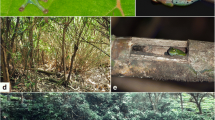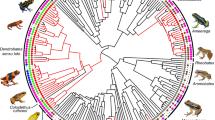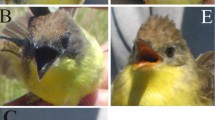Summary
In species with male parental care, polygyny may reduce the parental effort provided by a male, and hence impose a cost on the fitness of his mates, because of decreased growth, survival or health of offspring. I examined a cost of polygyny in the green dart-poison frog, Dendrobates auratus, a species with male parental care in which both male polygyny and mate guarding by females occurs (Summers 1989). All D. auratus males seen carrying tadpoles in a marked area were followed and the pools where they deposited their tadpoles were recorded. Males frequently deposited more than one tadpole in the same pool (in 25% of the observed depositions a male deposited a tadpole in a pool where he had previously deposited at least one other tadpole). Experiments involving manipulation of tadpole densities in pools typically utilized by D. auratus (calabash husks and treeholes) showed that increasing tadpole number had a strong negative effect on both growth rate and survivorship, indicating that polygyny can impose a cost on the fitness of a male's offspring. Hence, females do face a potential cost, in terms of reduced offspring growth and survivorship, when their mates mate polygynously and care for the offspring of other females.
Similar content being viewed by others
References
Alexander RD, Borgia G (1979) On the origin and basis of the male-female phenomena. In: Blum MS, Blum NA (eds) Sexual selection and reproductive competition in insects. Academic Press, New York, pp 417–440
Bateman AJ (1948) Intra-sexual selection in Drosophila. Heredity 2:349–368
Blaffer Hrdy S, Williams GC (1983) Behavioral biology and the double standard. In: Wasser SK (ed) Social behavior of female vertebrates. New York, Academic Press, pp 3–17
Breiehagen T, Slagsvold T (1988) Male polyterritoriality and female-female aggression in Pied Flycatchers Ficedula hypoleuca. Anim Behav 36:604–605
Jenni DA (1974) Evolution of polyandry in birds. Am Zool 14:129–44
Oring LW (1986) Avian polyandry: a review. In: RF Johnson (ed) Current ornithology, vol 3. Plenum Press, New York, pp 309–351
Patterson CB (1979) Relative parental investment in the red-winged blackbird. Ph.D. Thesis, Indiana University
Rose SM (1960) A feedback mechanism of growth control in tadpoles. Ecology 41:188–199
Summers K (1989) Sexual selection and intra-female competition in the green poison-dart frog, Dendrobates auratus. Anim Behav 37:797–805
Thornhill R, Alcock J (1983) The evolution of insect mating systems. Harvard University Press, Cambridge, MA
Trivers RL (1972) Parental investment and sexual selection. In: B Campbell (ed) Sexual selection and the descent of man, 1871–1971. Aldine Press, Chicago, pp 136–179
Wasser SK (1983) Reproductive competition and cooperation among female yellow baboons. In: SK Wasser (ed) Social behavior of female vertebrates. Academic Press, New York, pp 350–390
Wasser SK, Waterhouse ML (1983) The establishment and maintenance of sex biases. In: SK Wasser (ed) Social behavior of female vertebrates. Academic Press, New York, pp 19–35
Whittingham LA (1989) An experimental study of paternal behavior in red-winged blackbirds. Behav Ecol Sociobiol 25:73–80
Wilkinson L (1987) Systat: the system for statistics. Systat, Evanston, IL
Williams GC (1966) Adaptation and natural selection. Princeton University Press, Princeton
Wittenberger JF (1979) The evolution of mating systems in birds and mammals. In: P Marler, JG Vandenburg (eds) Handbook of behavioral neurobiology, vol 3, Social behavior and communication. Plenum Press, New York, pp 271–349
Yasukawa K, Searcy WA (1982) Aggression in female red-winged blackbirds: a strategy to ensure male parental investment. Behav Ecol Sociobiol 11:13–17
Author information
Authors and Affiliations
Rights and permissions
About this article
Cite this article
Summers, K. Paternal care and the cost of polygyny in the green dart-poison frog. Behav Ecol Sociobiol 27, 307–313 (1990). https://doi.org/10.1007/BF00164001
Received:
Accepted:
Issue Date:
DOI: https://doi.org/10.1007/BF00164001




